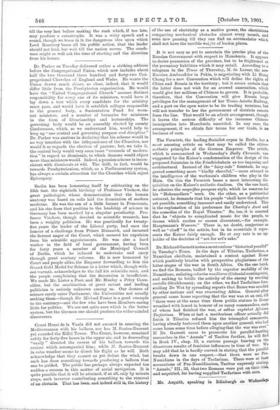Dr. Richard Garnett notes a most curious "historical parallel" in
Tuesday's Times. In the days of Tiberius, Tacfarinas, a Numidian chieftain, maintained a contest against Rome which positively bristles with prospective plagiarisms of the latter stages of the war in South Africa, On the one hand, we find the Romans, baffled by the superior mobility of the Numidians, enlisting cohortes auxiliares (Colonial contingents), and seeking to bridle the activity of the enemy by erecting cast ella (blockhouses); on the other, we find Tacfarinas fore- stalling De Wet by spreading reports that Rome was assailed by other nations and was evacuating Africa. General after general came home reporting that the war was at an end, till "there were at -the same time three public statues in Rome wreathed with laurel in honour of as many commanders, each of whom had finished the war, at adhuc raptabat .Africam Tacfarinas. When at last a meritorious officer actually did finish it Tiberius refused him the triumphal ornaments, having already bestowed them upon another general, who had come home some time before alleging that the war was over." If Dr. Garnett cares to prosecute his parallel-hunting researches in the" Anemia" of Tacitus further, he will find in Book IV., chap. 13, a curious passage bearing on the disastrous results of feminine influences in time of war. We may add that he is hardly correct in stating that the parallel breaks down in one respect,—that there were no Pro- Numidians in the days of Tacfarinas. There were at least accusations of Pro-Numidianism, Tacitus expressly stating, "Annals," IIL, 33, that two Romans were put on their trial, and acquitted, for having supplied Tacfarinas with corn.














































 Previous page
Previous page